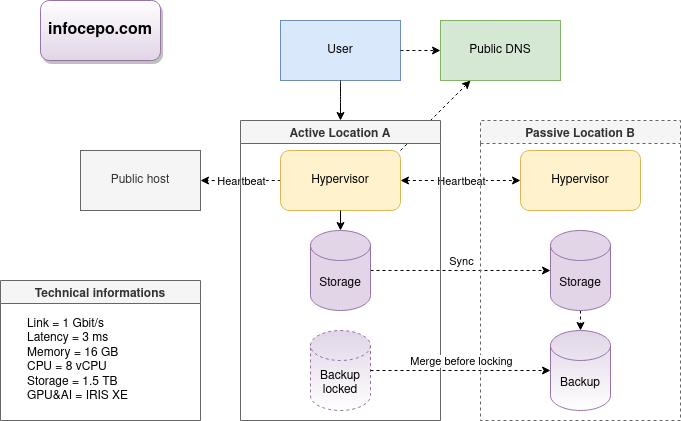LAB project
Jump to navigation
Jump to search
Resilient, low power and encrypted LAB CLOUD project.
Diagram
Data security
- availability is done via RSYNC & another location & LAB project#HA script & DNS
- integrity is done via BTRFS
- theft protection is done via AC & FDE encryption
- loss protection is done via AC & RSYNC & BTRFS & lock/unlock FDE disks
- scalability is be done via OPENSTACK
DNS provider
My LAB tools
- DEBIAN (Generic OS)
- x86 CPU (for ARM I will use QEMU emulator)
- GPU OpenCL (AI&SIGNAL processing)
- Diagram editor
- MEDIAWIKI (sharing editor)
- LXD/SNAP (container&virtual tool)
- tcpdump (Network monitoring)
- nmap (Network scanner)
Tested in this LAB
- NEXTCLOUD nextcloud.infocepo.com
- MEDIAWIKI infocepo.com
- KUBERNETES Cluster
- MARIADB GALERA Cluster
- OPENSTACK
- PROMETHEUS prometheus.infocepo.com (disabled)
- YACY (google.infocepo.com decentralized search engine) (disabled)
- GLUSTERFS
- KATA
- AWS CLI
- ANSIBLE
- GIT
HA
I love COROSYNC/PACEMAKER, but for this LAB I wanted something from scratch:
#!/bin/bash
#pacheco at infocepo.com
domainName=$(cat domainName)
portNumber=$(cat portNumber)
publicHost1=$(cat publicHost1)
publicHost2=$(cat publicHost2)
echo "$(date): init"
#Clean
stop${domainName}.sh
#If I was the master sleep a little !
ipPublic="$(dig +short myip.opendns.com @resolver1.opendns.com )"
ipMasterOld="$(nslookup ${domainName} |sed -rn 's#^Address: (.*)$#\1#p' )"
[ "${ipPublic}" = "${ipMasterOld}" ] &&sleep 240
#Wait master down (big loop)
while (nc -zw2 ${domainName} ${portNumber} >/dev/null 2>&1 ||(sleep 10 ;nc -zw4 ${domainName} ${portNumber} >/dev/null 2>&1 ) );do
if [ -z "$(find ha_synced -type f -mmin -60 2>/dev/null )" ] ;then
rsync --numeric-ids --delete --force --modify-window=1 --ignore-errors --block-size=128.00K --inplace --no-whole-file \
-z --compress-level=9 \
-aAXxv \
--backup-dir=rsync-rollback/$(date '+%Y-%m-%d') \
--exclude=rsync-rollback \
--exclude=.rsync_* \
--rsh="ssh -i ~/.ssh/storage@${domainName}.key -p ${portNumer} -oStrictHostKeyChecking=no" \
${domainName}:/storage/ /storage/ &&touch ha_synced
fi
sleep 10
done
#Maybe it's me down ! If INTERNET down, reboot
! ping -w2 -c1 ${publicHost} >/dev/null 2>&1 &&systemctl start kexec.target
#Become master
#Register DNS
ipMasterDown="$(nslookup ${domainName} |sed -rn 's#^Address: (.*)$#\1#p' )"
curl 'https://dynamicdns.park-your-domain.com/update?host=@&domain=${domainName}&password='"$(cat .namecheap-password )"'&ip='"${ipPublic}"
#Random startup time
sleep $((RANDOM%10))
${domainName}Start.sh &
#Wait DNS propagation
sleep $((240-25))
#Monitor
echo "$(date): up"
[ "${ipPublic}" = "${ipMasterDown}" ] &&ipMasterDown=""
while [ "${ipPublic}" = "$(nslookup ${domainName} |sed -rn 's#^Address: (.*)$#\1#p' )" ] \
&&( ! nc -zw2 "${ipMasterDown}" ${portNumber} >/dev/null 2>&1 ) \
&&(nc -zw2 "${ipPublic}" ${portNumber} >/dev/null 2>&1 ||nc -zw4 "${ipPublic}" ${portNumber} >/dev/null 2>&1 ) \
&&(nc -zw2 "${ipMasterDown}" ${portNumer} >/dev/null 2>&1 ||ping -w2 -c1 ${publicHost} >/dev/null 2>&1 ||ping -w2 -c1 ${publicHost2} >/dev/null 2>&1 ) ;do
sleep 4
done
echo "$(date): down"
#Stop
stop${domainName}.sh
#Reboot
systemctl start kexec.target
Optimizations explained
To reduce Network data I use options with rsync:
- only send modified data blocks from files
--inplace --block-size=128.00K
- compress transfert
-z --compress-level=9"
Futur
- Migrate rsync to real time replication.
Other
If you have ideas to improve something, send me an e-mail (pacheco at infocepo.com).
